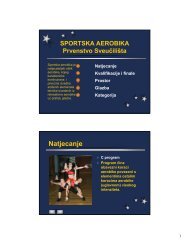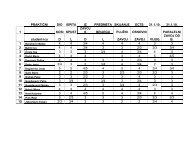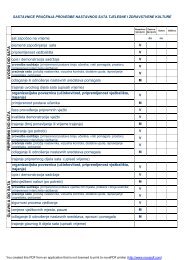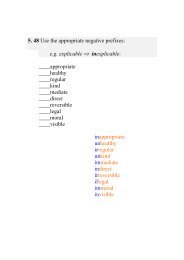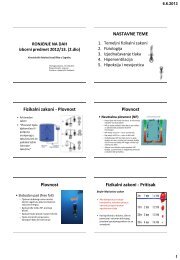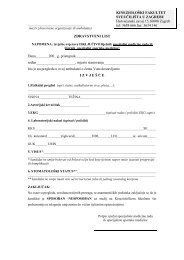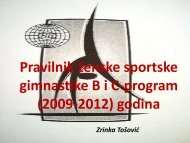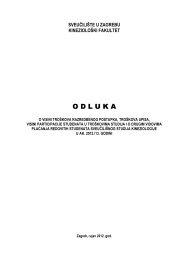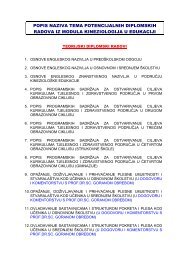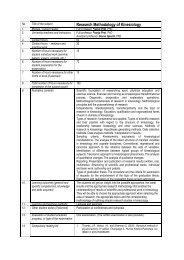REVISION OF TENSES
REVISION OF TENSES
REVISION OF TENSES
You also want an ePaper? Increase the reach of your titles
YUMPU automatically turns print PDFs into web optimized ePapers that Google loves.
<strong>REVISION</strong> <strong>OF</strong> <strong>TENSES</strong>
SIMPLE PRESENT<br />
(PRESENT SIMPLE)<br />
The simple present tense has the same form as the<br />
infinitive except in the third person singular in<br />
which an –(e)s is added to a verb.<br />
Affirmative: I play …; She plays …<br />
Negative: I do not (don’t) play …; She does not<br />
(doesn’t) play …<br />
Interrogative: Do I play …?; Does she play …?
Used with the following time<br />
adverbials:<br />
sometimes, always, often, never, every day,<br />
every week, every Wednesday, every<br />
month, every year, every …
PRESENT PROGRESSIVE<br />
(PRESENT CONTINUOUS)<br />
The present progressive tense is formed with the<br />
present tense of the auxiliary verb to be and the<br />
present participle (the infinitive + -ing) of the main<br />
verb.<br />
Affirmative: I am playing …; She is playing …<br />
Negative: I am not playing …; She is not playing …<br />
Interrogative: Am I playing …?; Is she playing …?
PRESENT PERFECT SIMPLE<br />
The present perfect tense is formed with the present<br />
tense of the auxiliary verb to have and the past<br />
participle of the main verb.<br />
Affirmative: I have played/gone …; She has<br />
played/gone …<br />
Negative: I have not played/gone …; She has not<br />
played/gone …<br />
Interrogative: Have I played/gone …?; Has she<br />
played/gone …?
Used with the following time<br />
adverbials:<br />
since, never, ever, just, already, yet,<br />
lately/recently, for
SIMPLE PAST (PAST SIMPLE)<br />
The simple past tense in regular verbs is formed by<br />
adding –ed to the infinitive. The simple past form<br />
of irregular verbs may be found in the list of<br />
irregular verbs.<br />
Affirmative: I played/went …; She played/went …<br />
Negative: I did not play/go …; She did not play/go<br />
…<br />
Interrogative: Did I play/go …?; Did she play/go …?
Used with the following time<br />
adverbials:<br />
yesterday, last week, last year, last Monday,<br />
last …, ago
PAST PROGRESSIVE<br />
(PAST CONTINUOUS)<br />
The past progressive tense is formed by the past tense<br />
of the auxiliary verb to be and the present participle<br />
of the main verb.<br />
Affirmative: I was playing … ; You were playing …<br />
Negative: I was not playing …; You were not playing<br />
…<br />
Interrogative: Was I playing …?; Were you playing<br />
…?
Used with the following time<br />
adverbials:<br />
the wole day yesterday, the whole evening<br />
yesterday and the like
Two parallel actions:<br />
While they were practising, he fell down and<br />
sprained the ankle.
PAST PERFECT SIMPLE<br />
The past perfect tense is formed with the past tense of<br />
the auxiliary verb to have and the past participle of<br />
the main verb.<br />
Affirmative: I had played/gone …; He had<br />
played/gone …<br />
Negative: I had not played/gone …; He had not<br />
played/gone …<br />
Interrogative: Had I played …?; Had he played/gone<br />
…?
FUTURE SIMPLE<br />
The future simple tense is formed with shall (for the<br />
1st person singular and plural) or will (possible for<br />
all the persons, both singular and plural) and the<br />
infinitive (without to) of the main verb.<br />
Affirmative: I shall/will play …; He will play …<br />
Negative: I shall/will not play …; He will not play …<br />
Interrogative: Shall/will I play …?; Will he play …?
PRESENT CONDITIONAL<br />
The present conditional tense is formed with<br />
should (for the 1st person singular and<br />
plural) or would (possible for all the<br />
persons, both singular and plural) and the<br />
infinitive (without to) of the main verb.<br />
Affirmative: I would play …<br />
Negative: I would not play …<br />
Interrogative: Would I play …?
PERFECT CONDITIONAL<br />
The perfect conditional tense is formed with<br />
should/would and the perfect infinitive of<br />
the main verb.<br />
Affirmative: I would have played …<br />
Negative: I would not have played …<br />
Interrogative: Would I have played …?



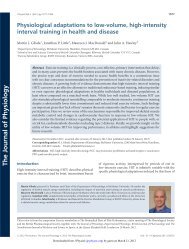

![NASTAVNI_PLAN_I_PROGRAM-_integrirani_studij [2,09 MiB]](https://img.yumpu.com/23830973/1/184x260/nastavni-plan-i-program-integrirani-studij-209-mib.jpg?quality=85)
